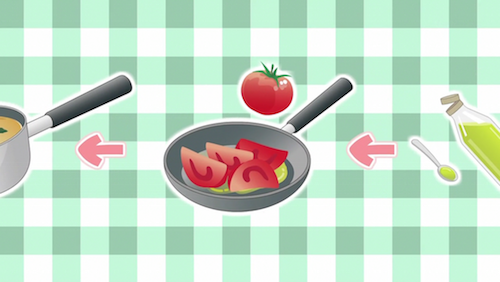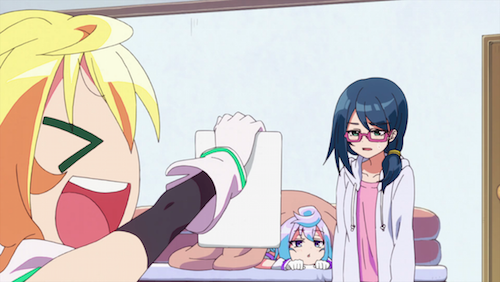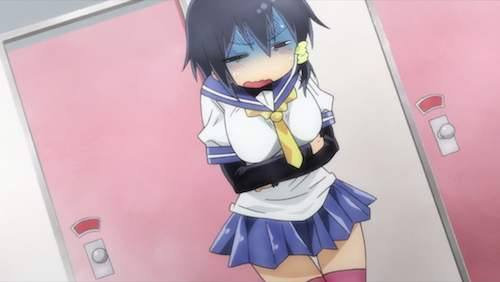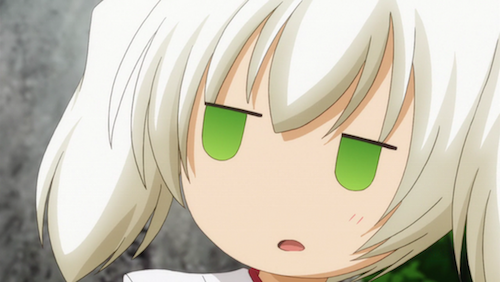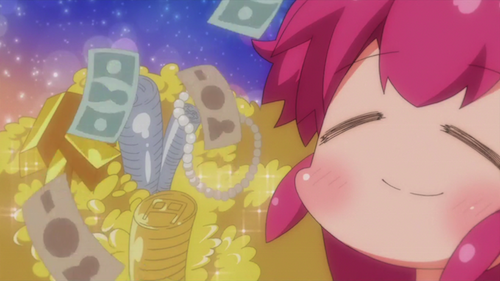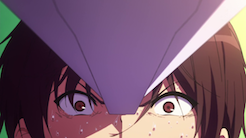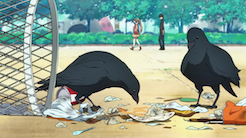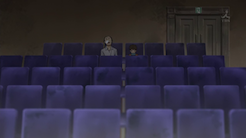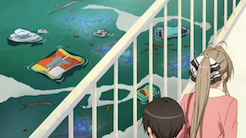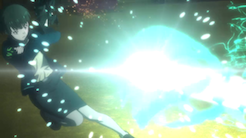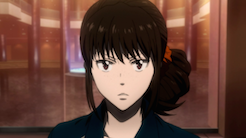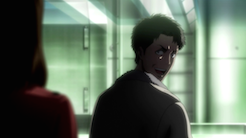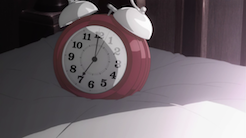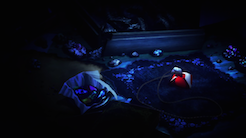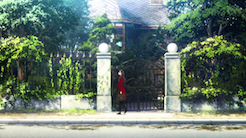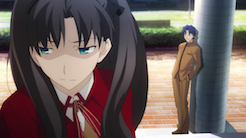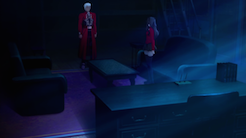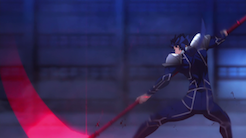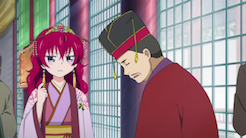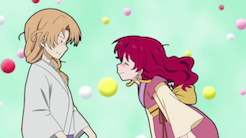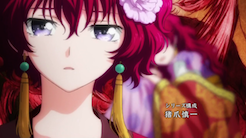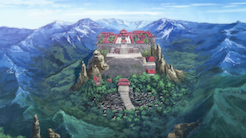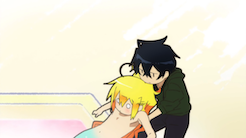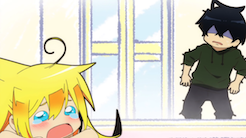Fate/stay night: Unlimited Blade Works(TV)
Short Synopsis: Our heroine is a plucky magician who summons a wise-cracking familiar.
Ninjarealist’s impressions: The much hyped Ufotable TV adaptation of Fate/stay night is here and let’s just get the big questions out of the way right up front: yes, the first episode lives up to the hype and no, this show is not for people who are unfamiliar with the Fate franchise. So if you haven’t seen the first adaptation, or the prequel, then you might as well just stop reading now. That’s not to say you might not get something out of the show, but the biggest failing of this adaptation is that it’s just not very accessible to newcomers. Events and characters get thrown at you so fast that you’ll have a difficult time following along if you don’t have a basic idea of the plot already.
Fate/stay night: Unlimited Blade Works really succeeds in all the ways you would expect from a Ufotable adaptation of a TypeMOON property. The animation is gorgeous, though I found myself less impressed with the flashy special effects and more impressed with the small details, like the hammers on Rin’s alarm clock or Archer absent-mindedly playing with a pendulum in the Tohsaka study. These small touches really go a long way in enhancing the atmosphere of the show. There are some noticeably horrendous textures that become especially obvious in a few scenes, but overall I was struck by how many of the visuals, especially the indoor vignettes, reminded me of still images from the visual novel. It’s not just a good-looking adaptation either: I like the script. Rin has never been more likable and Archer is wittier than ever. Their antics repeatedly made me chuckle and play out almost like an 80’s buddy-cop movie. I think a lot of why the dialogue works so well is the consistent pacing. On the other hand some aspects of the show did feel overwrought. The characters, while endearing, are prone to rattling off extended monologues that often feel a bit hamfisted. The Hideyuki Fukasawa score isn’t bad but honestly, the best parts of this episode are the parts with no music at all. I hope that in future episodes this show uses a little less music. This is especially problematic in the fight scenes, which do feel a little bit overdone, a feeling that is only enhanced by the epic, orchestral, score. Still, this is a quality adaptation that manages to hit most of the right notes. It’s hard for me to see fans of the franchise being disappointed by this. My biggest criticism is that it’s just not very accessible to everyone else.
Potential: 75%
Akatsuki no Yona
Short Synopsis: The protagonist is a princess in a “Romance of the Three Kingdoms” style fantasy setting.
Ninjarealist’s impressions: Like many anime fans on the internet, when I first saw the preview for this show I was reminded of another Studio Pierrot series, The Twelve Kingdoms. I’m a big fan of that show and from the classical Chinese setting to the red-haired protagonist, Akatsuki no Yona seemed almost like it was inspired by that venerable series. Alas, appearances can be deceiving. Beyond the superficial similarities Akatsuki no Yona doesn’t feel anything like The Twelve Kingdoms. If anything, it feels more like an adventure series in the mould of Full Metal Alchemist or recent Studio Pierrot-influenced product The Legend of Korra. That’s not necessarily a bad thing and in a lot of ways Akatsuki no Yona seems to be getting this formula right. Yona manages to be a surprisingly likable character and her banter with the other characters actually made me chuckle pretty consistently. The audio/visual presentation is extremely good with a very solid performance by Chiwa Saito as the lead. Still, while this show seems to have a lot of the elements of a good series, it feels kind of soulless so far. The thematic content is pretty shallow and the aristocratic setting is lacking in any sort of grit to make the world feel lifelike. Then again, the show clearly has a lot of ground to cover, so I wouldn’t be surprised if we get more of that later on. But a bigger issue for me is the direction. While the individual shots look great, the pacing feels a little too convenient. Characters always show up exactly when you would expect them too and dramatic moments unfold in a way that feels a little too scripted and artificial for me. Contrary to what you would expect from the first episode in an adventure series, there isn’t much action and the action we do see is not particularly well-choreographed. It’s unclear to me whether this will change later in the series. Lack of action isn’t usually a bad thing, but if the narrative and thematic content continue to be so weak then I can’t see them carrying the show. Akatsuki no Yona does have most of the elements of an entertaining adventure series and I think it will be a modest success if it goes that route. But if the show is trying to be something more serious I’m not encouraged by this first episode.
Potential: 50%
Orenchi no Furo Jijou
Short Synopsis: Our protagonist has a cute merman living in his bath.
Ninjarealist’s impressions: I’m a big believer in short comedies. Teekyu and Poyopoyo are some of my favorite shows in recent memory, and they really demonstrated why the short format works so well for humor. A common problem with full-length comedy series is that the first episode will use up all the jokes and the rest of the series goes downhill from there. This doesn’t happen as often with short comedies because they’re over so quickly that there just isn’t enough time to use up all the jokes. It’s clear after the first episode that Orenchi no Furo Jijou still has a lot of cards in its hand. So far the series has barely scratched the surface of what a high-school aged boy and his handsome, physically-affectionate, merman friend might do together in a bath. The first episode was surprisingly funny. The Merman, is just completely, over-the-top, ridiculous, both in appearance and personality. This is accentuated by his seiyuu, rookie Yuuichiro Umehara, whose voice manages to be both deep and effeminate at the same time. Seeing him tease the deadpan protagonist was funnier than I expected it to be. Still, as many joking anime viewers have pointed out, this show is essentially Free! in a much smaller pool. It’s a cute guys doing cute things show. That’s not inherently a bad thing, but it doesn’t usually make for the most interesting viewing. The hilarious OP, and the sheer absurdity of the premise, both seem to suggest that this show might be a parody, and I do like parodies, but I’ve been burned too many times in the past by comedies that promise parody and just fail to deliver it. I can’t recommend this show to anyone but serious slice-of-life fans.
Potential: 35%

